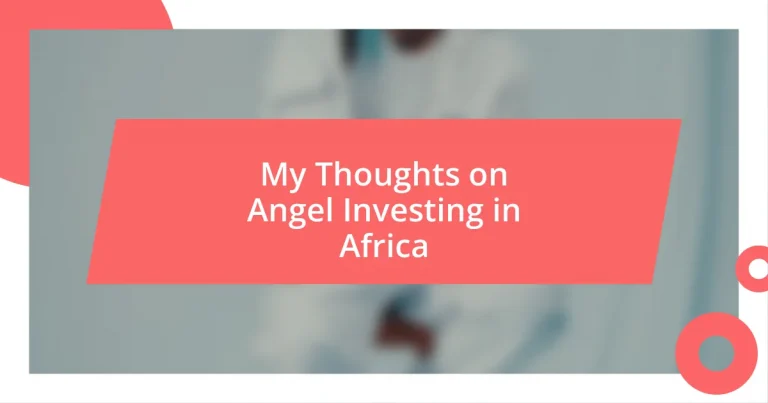Key takeaways:
- Angel investing in Africa thrives on personal relationships and cultural understanding, which are crucial for successful ventures.
- Key trends include rapid growth in fintech, a focus on sustainability, and community-driven innovations across various sectors.
- Investors face challenges such as regulatory complexities, a lack of reliable data, and the need for patience in building trust with local entrepreneurs.

Understanding angel investing in Africa
Angel investing in Africa is an increasingly vibrant space, teeming with potential yet layered with challenges. When I think back to my first encounter with an African startup, I was struck by the sheer passion of the entrepreneurs and the innovative solutions they were crafting. It’s fascinating to witness how local knowledge and creativity can lead to groundbreaking ideas, but how many investors truly understand the cultural nuances that can influence success?
Many angel investors overlook Africa’s diverse markets and rapidly growing tech ecosystem. I remember chatting with a seasoned investor who emphasized the importance of building relationships and trust first, rather than rushing into financial commitments. It’s this personal touch and understanding that often differentiates successful investments in the continent from those that falter. Have you ever considered how a simple conversation could uncover insights that data alone might miss?
The landscape of angel investing in Africa is evolving, with new networks and platforms emerging to support startups. This environment encourages collaboration and mentorship, which are crucial for growth. I often wonder, how can investors leverage these networks not just to fund, but to genuinely propel the next wave of innovation? For me, witnessing these connections feels like being part of something much larger—an ecosystem that thrives on shared success.
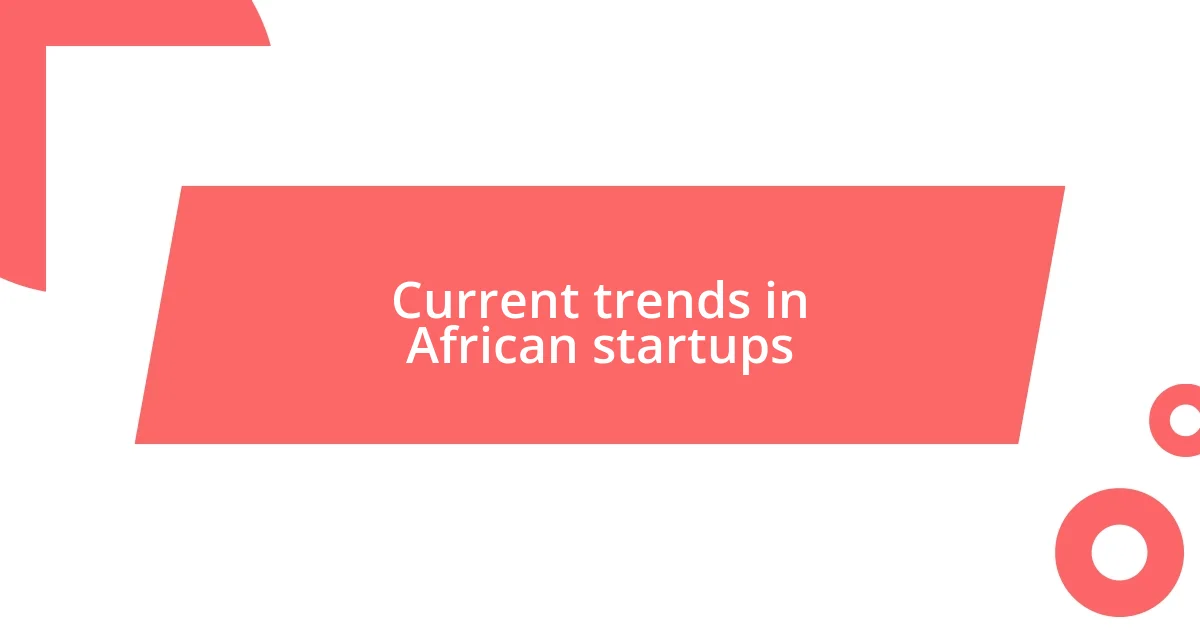
Current trends in African startups
It’s exciting to see that African startups are embracing tech solutions across various sectors, from fintech to agritech. I recall visiting a startup incubator in Nairobi, where entrepreneurs were passionately presenting their ideas on using technology to enhance agricultural productivity. This kind of innovation reflects a deep understanding of local needs and a willingness to tackle challenges head-on.
Here are some noteworthy trends I’ve observed in African startups:
- Rapid Growth in Fintech: Financial technology is booming as startups address the unbanked population, with mobile payment solutions gaining traction.
- Sustainability Focus: Many companies are prioritizing eco-friendly practices and products, responding to global concerns about climate change.
- Healthtech Innovations: Startups in the health sector are leveraging telemedicine and digital health records to improve access to healthcare services.
- Investment in Education: Edtech solutions are emerging, providing e-learning platforms that cater to the continent’s diverse demographic.
- Community-Driven Solutions: There’s a rising trend of startups co-creating products with their communities, ensuring relevance and sustainability.
These developments make me optimistic about the transformative power of innovation in Africa, as founders work tirelessly to shape a brighter future for their communities.
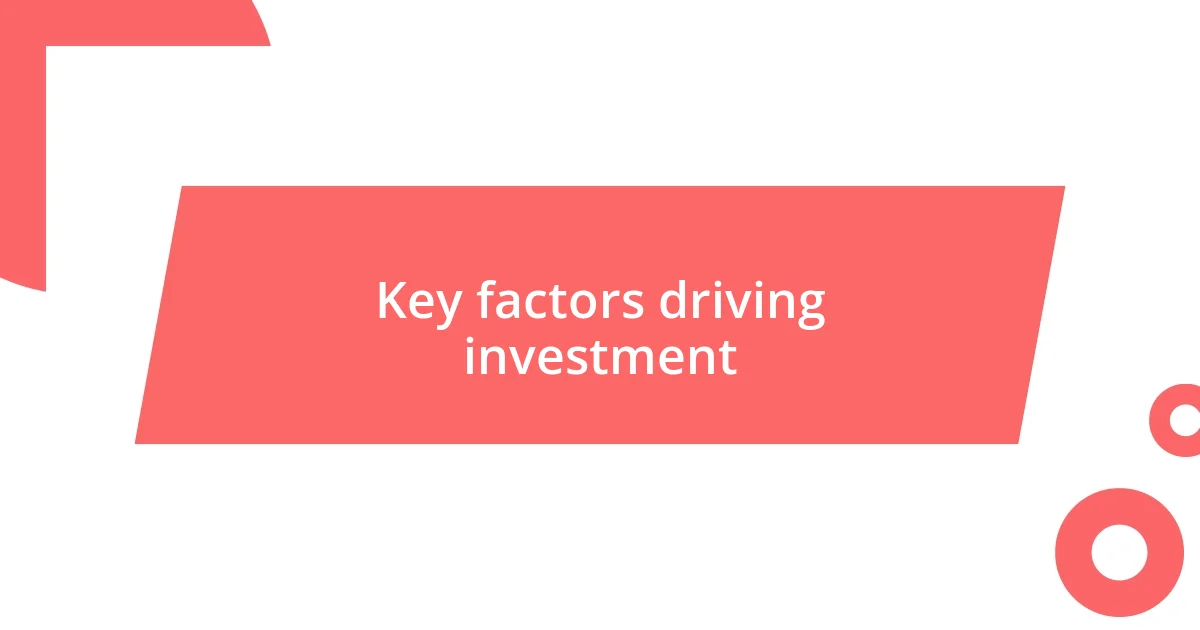
Key factors driving investment
The growing middle class in Africa is a significant factor driving investments. I remember sitting in a café in Accra, where I overheard conversations about new lifestyle products aimed at young professionals. It really highlighted to me the potential for businesses that cater to this expanding demographic. As purchasing power increases, so does the demand for innovative solutions, presenting ripe opportunities for investors willing to tap into this market.
Another factor is the increasing availability of technology and infrastructure. The first time I used mobile payment in Kenya, I was astonished by how seamlessly it operated, connecting millions to financial services. This technological adoption not only enhances business efficiency but also fosters the growth of startups that can leverage these tools to scale quickly and effectively. Isn’t it remarkable how access to technology can transform entire industries overnight?
Lastly, supportive government policies are playing a crucial role. I recall my discussions with startup founders who often cited favorable regulations and tax incentives as game-changers for their businesses. These policies help create an environment conducive to investment and innovation. When investors see a government committed to fostering entrepreneurship, it naturally boosts their confidence in putting their money into local ventures.
| Key Factors | Impact on Investment |
|---|---|
| Growing Middle Class | Increased demand for products and services, presenting lucrative investment opportunities. |
| Technology and Infrastructure | Enhanced business operations and rapid scaling potential for startups. |
| Supportive Government Policies | Encouragement for entrepreneurship, improving investor confidence. |
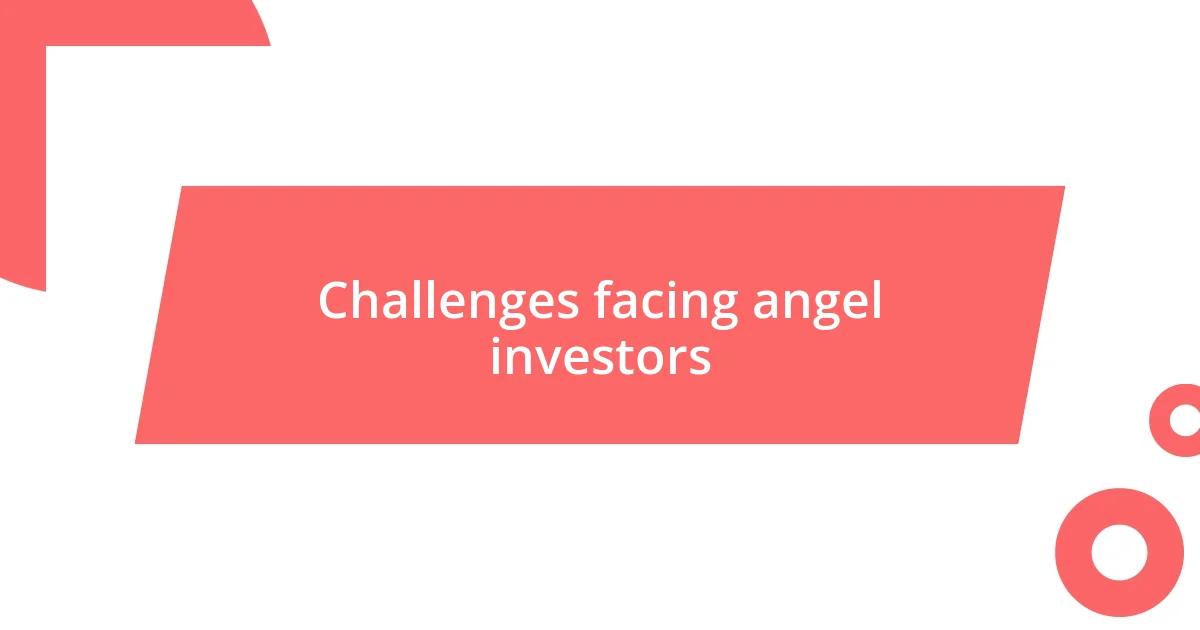
Challenges facing angel investors
Investing as an angel investor in Africa comes with its own set of challenges, primarily due to the regulatory landscape. I’ve seen firsthand how navigating different legal frameworks across various countries can be a daunting task. For example, when I was exploring investment opportunities in Nigeria, I encountered complex tax regulations that seemed designed to protect local interests but often left foreign investors puzzled. Doesn’t it make you wonder how such barriers could stifle otherwise promising ventures?
Another significant hurdle is the scarcity of reliable data on startups and their performance metrics. I’ve experienced moments of frustration when entrepreneurs presented compelling ideas but lacked solid financial projections or historical data to back them up. How can one make informed investment decisions without transparency? This lack of information creates an atmosphere of uncertainty that can deter even the most enthusiastic investors.
Additionally, the cultural nuances in business practices can affect investor relations. While meeting with a startup team in South Africa, I observed that their approach to negotiations was more relationship-driven than what I’m accustomed to in my experiences elsewhere. This can be both a challenge and an opportunity. It often requires investors to adapt their expectations and embrace patience in building trust. But isn’t that a crucial aspect of any meaningful partnership?
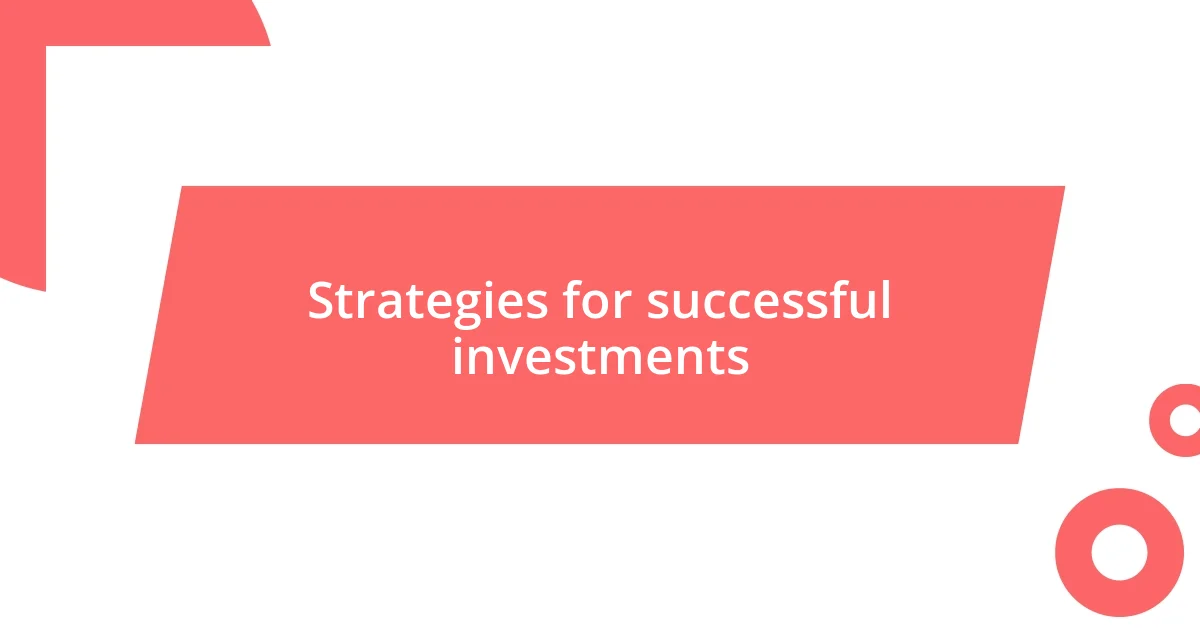
Strategies for successful investments
One effective strategy I’ve found for successful angel investing in Africa is building a strong local network. During my early days as an investor, I remember joining local entrepreneur meet-ups in Nairobi. Engaging with founders and other investors allowed me to gain invaluable insights and perspectives on the local market. It made me realize that relationships often unlock opportunities that wouldn’t be available through formal channels. Isn’t it fascinating how personal connections can lead to unexpected prospects?
Another avenue I’ve discovered is focusing on sectors that have shown resilience and growth. While evaluating potential investments, I’ve noticed that businesses in agriculture and fintech tend to attract consistent interest. My experience at a tech incubator in Lagos highlighted how startups solving real problems in these fields often have clearer paths to profitability. If you can identify these trends early, you’ll position yourself to invest in ventures that not only contribute to local economies but also yield promising returns.
It’s critical to approach investments with a patient mindset. I learned this firsthand when I invested in a health tech startup that initially struggled to gain traction. Instead of pulling out, I chose to support them and stayed engaged throughout their growth journey. Today, they’re flourishing, and that long-term commitment has paid off. Don’t you think that sometimes, the best investment decisions require a willingness to see potential where others might not?












